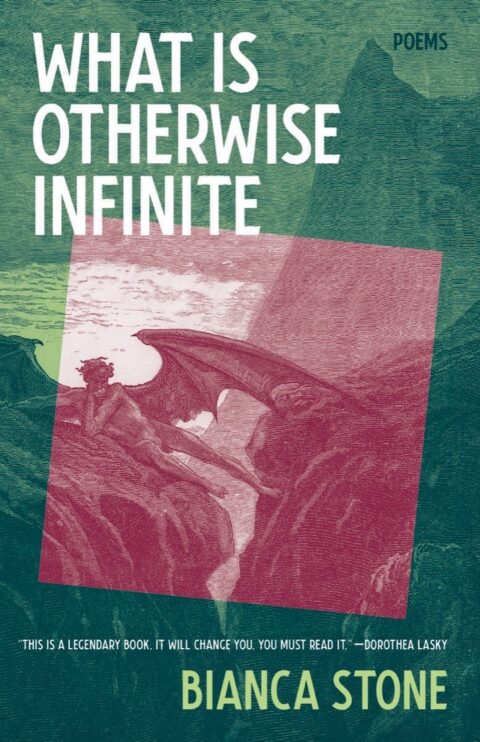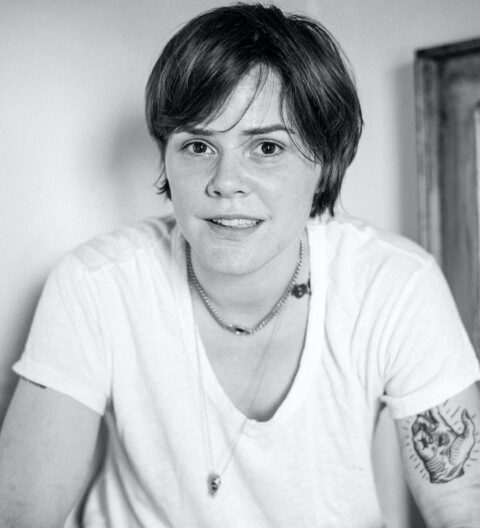 Bianca Stone’s new book of poetry, What Is Otherwise Infinite, her fourth in twelve years following Someone Else’s Wedding Vows, The Moibus Strip of Grief, and Poetry Comics, from the Book of Hours, concatenates from one stunning poem to the next throughout its 113 pages. Stone’s evocative imagery, wild leaps, risible asides, winsome sprezzatura, cerebral surprises, and deep foraging into an array of such timeless and timely subjects as Marcus Aurelius, mythology, Mary Magdalene, the environment, marriage, quantum mechanics, God’s search for God, and human nature, to mention only a few, instill her poems with memorable “news” that is as refreshingly ambitious in its intent as it is electric in its meanings.
Bianca Stone’s new book of poetry, What Is Otherwise Infinite, her fourth in twelve years following Someone Else’s Wedding Vows, The Moibus Strip of Grief, and Poetry Comics, from the Book of Hours, concatenates from one stunning poem to the next throughout its 113 pages. Stone’s evocative imagery, wild leaps, risible asides, winsome sprezzatura, cerebral surprises, and deep foraging into an array of such timeless and timely subjects as Marcus Aurelius, mythology, Mary Magdalene, the environment, marriage, quantum mechanics, God’s search for God, and human nature, to mention only a few, instill her poems with memorable “news” that is as refreshingly ambitious in its intent as it is electric in its meanings.
Stone avoids any temptation of “poetic” intellectualizing by mixing humor with heuristic riffs that entertain in a way that “makes new.” James Tate meets Russell Edison (at times) meets Julian of Norwich in her poems, as evidenced so eclectically in the following random selection of lines from poems one might turn to anywhere in the book that give off what the poet and critic Major Jackson describes as “the glow of twenty first century enlightenment”:
We settle in to read aloud the linguistic eloquence of obscure
contemporary fucking poetry. The pitfalls of Descarte’s
dualism. The anarchy of flesh. The anxiety of goodness.
This will give us some idea of what’s to come,
we say confidently, gathering around ourselves
the magazines of cutting-edge
sorrow, of effort, of words.
Surely this is it.
from “The Human Good”
I have put aside all the blank meaningless words
and decided to go totally naked
into the always luscious Elysian dump
of the hereafter. Say nothing at all.
from “A Suckling Pig’s Prayer”
It was common knowledge that Jesus was everyone.
Loved Mary Magdalene best of all the disciples.
That all the women surrounding him were named Mary.
Confusing on purpose. That the myth
was created to make a tangible basis of comparison.
from “Apocrypha”
I’ve disappeared into the huge false teeth of my grandma’s mouth
hoping she’ll posthumously forgive me for our fight
when she shouted so hard they fell out.
from “Quantum Mechanics Reveal the Unique Behaviors of Subatomic
Particles That Make Up All Matter”
I wanted
To witness the creator love his conception.
But it soured me. I made garlands of that pain.
Adorned the mirror with it.
Now, I stand transfixed before it.
Beatrice implodes in me.”
from “Beatrices”
When you go I will be
the moth, the butterfly,
turned to broth in the cocoon.
Reassembled, I Will climb out
And you will be subsumed
Into a majesty of vapor
Gone as an orchid.
from “In Absence — This Unknowing”
And then there are also just her refreshingly confessional poems that are more just colorfully personal than “confessional,” like her poem “Routine” that opens with these relatable, candid lines: “Some days I get up to go for a run / but instead just sit in spandex / and write about the fox.”
 Having spent much of her childhood with her grandmother, the inimitable Ruth Stone, who recited poetry to her grandchildren and played a poetry game with them at her house in Goshen, Vermont, Stone grew up with poetry at the center of her life, especially the duende-inspired poetry her grandmother wrote and recited that contained an indelible bittersweet that influenced Stone profoundly. The dialectic that Stone the younger maintains between pathos and humor, agon and catharsis, grief and happiness, figurative expression and plain speech maintains a consistent moving tension in her language that courses between her intellect and her emotions. In poem after poem, she risks imaginative leaps that take what Hart Crane called “certain liberties” — language that surprises with new meaning for the way it frees up her perception and language. “Get down on your knees,” she orders herself in her poem “Yield” “and be thunderstruck with language. / Start in like those fanatics you read about// who stop eating and drinking and live on the breath of irises, heavy mist.”
Having spent much of her childhood with her grandmother, the inimitable Ruth Stone, who recited poetry to her grandchildren and played a poetry game with them at her house in Goshen, Vermont, Stone grew up with poetry at the center of her life, especially the duende-inspired poetry her grandmother wrote and recited that contained an indelible bittersweet that influenced Stone profoundly. The dialectic that Stone the younger maintains between pathos and humor, agon and catharsis, grief and happiness, figurative expression and plain speech maintains a consistent moving tension in her language that courses between her intellect and her emotions. In poem after poem, she risks imaginative leaps that take what Hart Crane called “certain liberties” — language that surprises with new meaning for the way it frees up her perception and language. “Get down on your knees,” she orders herself in her poem “Yield” “and be thunderstruck with language. / Start in like those fanatics you read about// who stop eating and drinking and live on the breath of irises, heavy mist.”
Stone trusts language implicitly to lead her into those figurative gardens of “irises” and “heavy mist” where she, “barely tethered / to anything whole,” ventures “out the window” where in a mystical state she is “sucked into her own reflection for what she calls “it,” which she then describes in an apostrophe to herself as “not even your own affliction, / yet…is / afflicting everything.”
This mimetic, troubling muse transports Stone to a vatic zone where she apprehends herself as herself and “other” at the same time, leaving her “afflicted” but visionary in her unique distance from isolation; that is, in her willingness to immerse herself in John Keats’ criteria for “negative capability”: “uncertainties, mystery, doubts.” It is precisely in these uncomfortable but transportive places, all of which are “out the window,” that Stone in turn transports herself, as well as her reader.
[Published by Tin House on January 18, 2022, 125 pages, $16.95 paperback]